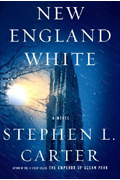
The Morning News Tournament of Books, sponsored by Powell’s Books, is an annual battle royale amongst the top novels in “literary fiction” published throughout the year. Read more about this year’s tournament »
» Buy the Books at Powells.com «
» Meet This Year’s Judges «
» Wager for Charity «
» Relive the Action: ’07, ’06, ’05 «
» Contact the Tournament Staff «
• ROUND ONE • MATCH FOUR •
From the Booth
 |
You Don’t Love Me Yetby JONATHAN LETHEM |

|
| v. | ||
New England Whiteby STEPHEN CARTER |
commentary by KEVIN GUILFOILE & JOHN WARNER
KEVIN: I enjoyed New England White more than Jessica did, which is to say that I enjoyed it at all. Stephen Carter tries to write ambitious books about contemporary race and politics and then also tries to structure them around a mystery plot, which is an honorable idea. Every year I argue that books themselves aren’t either genre books or literary books. It’s the expectations of the reader that define them. Lots of writers work the DMZ between literature and genre with varying degrees of success (Lethem has attempted it frequently himself), but I’m afraid one of the obstacles to the success of any book is the expectation of the reader. If they pick it up expecting Robert B. Parker they’re going to say, “This is way too slow.” And if they pick it up expecting Thomas Pynchon they’re going to think, “Where are the funny dudes in the balloon?”
I don’t think that was Jessica’s problem here—I think she just didn’t enjoy it—but Carter writes about upper-class African Americans, a group underrepresented and under-examined in contemporary fiction, with terrific detail and insight. I think his voice is an important one. Maybe I’ll concede that suspense plotting is not his strongest suit.
As for foreshadowing, I once taught a writing workshop to a group of about a dozen adults, all of whom claimed they wanted to write “literary fiction” and we were discussing specifically how you move plot along and I made a reference to foreshadowing and one of them raised her hand and said, “What’s foreshadowing?”
I asked the rest of the class of aspiring novelists if they could give an example and got shot in the forehead with blank stares. So maybe Stephen Carter does a little too much foreshadowing only because the rest of the literary world is doing too little of it. Or maybe they’re just not teaching Shakespeare in high school anymore.
Anyway, wouldn’t it be funny if, without even knowing it, Jessica’s mention of Zadie Smith and the Willesdon Herald contest turned out to foreshadow future events in this very Tournament?
Gasp!
JOHN: Jessica appears to not only loathe New England White, but the paper it’s printed on, the glue it’s bound with, and even the carbon the ink was made out of, and bravo to her for saying so. I actually appreciated Zadie Smith’s openness about her responses to the finalists for the Willesden Herald contest as well. In both cases, I admire the candor.
And of course Zadie Smith was roasted for sharing her thoughts—not as roasted as that baby in The Road, but she was generally cuffed around for being elitist, clueless, and successful. In fact, it seemed as though the resentment flowed most strongly because Zadie has already “made it” to the top of the peak and was therefore obligated to reach a hand down and drag someone to the top with her, regardless of how she viewed the quality of the candidates. (Note that she put up the prize money out of her own pocket, so it’s not as though Ms. Smith is trying to strangle developing writers in their cribs.)
I bet I could dive into the Willesden Herald contest pool and find something I think is brilliant, but the point is that Zadie Smith didn’t and said so without, to my mind, being B.R. Myers-style hurtful or dismissive of the work that had been submitted. For me, it illustrated one of the fundamental tensions of public discourse in our society, namely that we seem to thirst for “honesty” and “authenticity” and yet we don’t want too much honesty. As you note, with your defense of New England White, it’s entirely possible to agree to disagree.
Except about the relative merits of Hillary Clinton and Barack Obama. Barack rulz, Hillary droolz, and that’s all there is to it.

» DOWNLOAD THE BRACKETS «
• Round One •
Tree of Smoke v. Ovenman
judged by Tobias Seamon
The Savage Detectives v. Let the Northern Lights Erase Your Name
judged by Elizabeth Kiem
Then We Came to the End v. Petropolis
judged by Anthony Doerr
You Don’t Love Me Yet v. New England White
judged by Jessica Francis Kane
Run v. Shining at the Bottom of the Sea
judged by Kate Schlegel
What the Dead Know v. The Brief Wondrous Life of Oscar Wao
judged by Elizabeth McCracken
On Chesil Beach v. Remainder
judged by Ze Frank
The Shadow Catcher v. An Arsonist’s Guide to Writers’ Homes in New England
judged by Helen DeWitt
• Round Two •
Tree of Smoke v. Let the Northern Lights Erase Your Name
judged by Mark Sarvas
Then We Came to the End v. You Don’t Love Me Yet
judged by Maud Newton
Shining at the Bottom of the Sea v. The Brief Wondrous Life of Oscar Wao
judged by Ted Genoways
Remainder v. The Shadow Catcher
judged by Mark Liberman
• SEMIFINALS •
Tree of Smoke v. Then We Came to the End
judged by Gary Shteyngart
The Brief Wondrous Life of Oscar Wao v. The Shadow Catcher
judged by Nick Hornby
• ZOMBIE ROUND •
Then We Came to the End v. Remainder
judged by Rosecrans Baldwin
The Brief Wondrous Life of Oscar Wao v. The Savage Detectives
judged by Andrew Womack
• FINAL ROUND •
Remainder v. The Brief Wondrous Life of Oscar Wao
All Judges + Jennifer Szalai